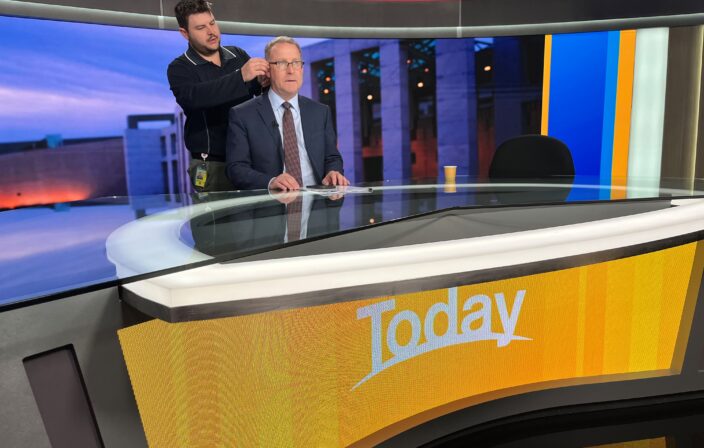Transcript: Andrew McKellar interview on 6PR with Gary Adshead
14 Oct 2024
|Transcripts
Event: Andrew McKellar interview on Perth radio 6PR
Date: Monday 14 October 2024
Topics: Changing the legal definition of small business employers.
E&OE
Gary Adshead:
Andrew McKellar is the CEO of the Chamber and he joins us on the line. G’day, Andrew.
Andrew McKellar:
Good morning Gary. Great to be with you.
Gary Adshead:
Now mate, I’m not sure whether it’s the ACTU have sort of tried to hedge you off at the pass here, but what are you planning or looking at or asking about in relation to how we define small business?
Andrew McKellar:
Yeah, sure. Look, what we want to do, we want to shine a light on the challenges that small business is facing at the moment, and we want to make sure that the major parties are thinking about what is the best way to give small business an even break as we come up to the next election. Because at the moment, small business is facing two major challenges. One, they’ve had rising costs of doing business just like everybody else, just like households, just like individuals. It’s getting more and more expensive for a small business to be able to actually get their materials, get their inputs, engage labour, all of those things. The other thing which is absolutely killing small business at the moment, and that is the rising burden of red tape. So one of the things we are saying is make it easier for small business, increase the definition of small business in the Fair Work Act from 15 to 25 employees that will carve out a lot of small businesses who are really struggling at the moment. It’ll make it easier for them to comply with the red tape burden that they currently have
Gary Adshead:
Because obviously Sally McManus just forecast that you mentioned, you talk about red tape and saying that this is about making life easier for small business employers. She says it’s about making the way that you can deal with the employees easier for the employer by way of casualisation of workforce, et cetera, because the same protections won’t be there. What do you say to that?
Andrew McKellar:
Well, it’s not about reducing protections. What it is about is it’s about making it easier for small business to make the decision to create a job or to employ somebody and then cutting out the level of compliance and red tape and the difficulty they have to go through and the timetables and the decisions, the reporting, all of those sorts of things which just make it impossible for many small businesses to employ people and in many cases we see small businesses getting to the point where they say, ‘it’s all too hard, we’re going to close the door.’ Now if you want to strip somebody of their entitlements or their rights at work, the way to do that is to run the risk that a small business is going to shut down or that somebody won’t have a job at the end of the week. So I think really here the ACTU are missing the wood for the trees.
Gary Adshead:
So just tell us what difference it would make to someone in a small business then if that definition went from 15 or less to 25 or less.
Andrew McKellar:
Well, yeah, and there’s a whole raft of things at the moment, which small business has to consider. The threshold at the moment in the act for everything except for one provision is 15 employees. So whether it’s multi-employer bargaining, whether it’s engaging somebody under a labour hire order, paying union workplace delegates for time off to undertake the union training, the casual employment conversion deadline, all of those things, those are all at the moment cutting in at 15 employees. So what we want to see is make it easier for a business with up to 25 employees to be able to go about the decision of how to run their business. They don’t normally have their own HR department or they’ve got to engage an external lawyer to make sure that they’re getting all of these things right. That’s added cost, that’s added time that they don’t have.
Gary Adshead:
How is the backbone of the country going at the moment in terms of where the economy’s at, where unemployment’s at and so on in terms of small business would you say?
Andrew McKellar:
Look, for many small businesses, they’re doing it very tough and you don’t need to look further than the sort of figures we saw last week. Record levels of insolvencies. Now that’s not all just economic conditions. Of course there is a backlog of small businesses perhaps who were buffered during the pandemic and now some of that is coming home to roost. But earlier this year we surveyed small businesses. We found 82 per cent of respondents said that they find red tape compliance is a major issue for them. 61 per cent of businesses said that that burden had gone up significantly in the past year and nearly half of all businesses, half of all small businesses, 45 per cent said in the past 12 months they have thought about closing their doors. That’s not a situation which is comfortable or acceptable. And I think that’s why we say, look, small businesses is a major part of the backbone of the economy. Two and a half million small businesses out there, we should give them a go.
Gary Adshead:
Who is it? The minister, workplace Minister Murray Watt, has come out, just so you know, and stridently said that there’s no chance of them changing it, not thinking his words. I’m reading from a quote on ABC, which said that he, he’s not going to make it easier for small sized businesses to sack people unfairly. How do you feel about that?
Andrew McKellar:
Well, I’m going to read you another quote and that’s a quote from Senator David Pocock when he agreed to support the government’s workplace changes legislation in February this year. And he said that he had done a deal with the government and it was that small businesses will also be carved out of the civil penalties provisions and the “government is open to a review or to review the definitions of small business across commonwealth legislation to consider their appropriateness”. So that was an undertaking that was given to get the support of the cross bench to get their legislation through. So I think I’d like to remind the minister, I’m sure his advisors probably are doing that right now, but that’s a commitment from the government and I think the government should be held to account for the commitments it gives in order to secure passage of its legislation.
Gary Adshead:
Now of course we do sort of edge closer to a federal election. The opposition say that it’s something that they will consider. Are you asking them to take this to the election as policy and is there a risk involved in that given that there are people who work in small businesses that might be nervous about the definition change?
Andrew McKellar:
Well, I think this is a great thing for small businesses. We’ve got to, I think, give small business an even break. We’re asking the major parties to be mindful of this and of course we would hope that the major parties will be there to support small business in the next term of government. So whether it’s the existing government, whether it’s the opposition as we go to the election, small business has got to be on the radar screen. That’s what we want to see. We’re going to stand up for small business and we want them to do that as well.
Gary Adshead:
Alright, well like I said, it’s emerging as more of a political argument as we get closer to the election. I appreciate you coming on and speaking about it with us today.
Andrew McKellar:
Perfect. Thanks very much. Gary.


